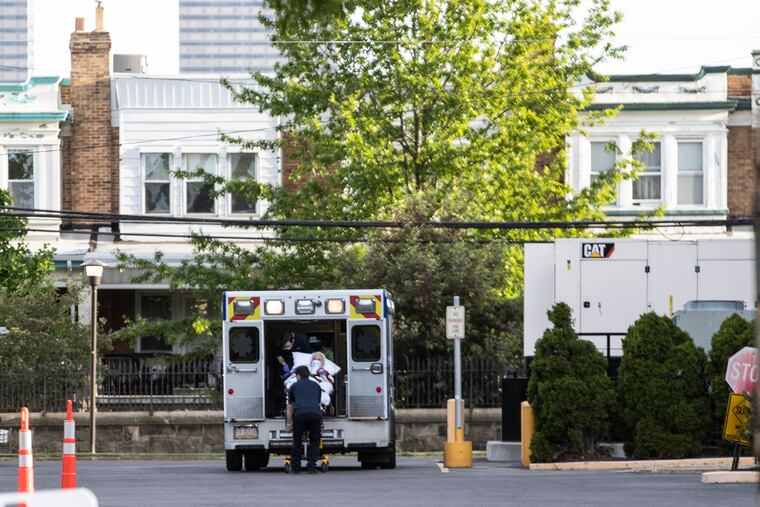As coronavirus numbers keep climbing, Wolf weighs ‘targeted’ restrictions
Wolf said that for now he isn't looking at a sweeping stay-at-home order.

With Pennsylvania’s coronavirus case numbers higher than they have been in any daily report since the onset of the pandemic, Gov. Tom Wolf on Thursday said that he would consider stiffening restrictions on a “targeted” basis but that he had no plans to issue another sweeping stay-at-home order.
At least for now.
Asked directly at a news briefing if such an order was in play, Wolf responded with an emphatic “No.” But after a pause: “Well, who knows, there’s a chance. We have done everything in Pennsylvania to make sure that doesn’t happen.”
The state reported 2,063 new coronavirus cases Thursday; that would qualify as the highest one-day total since the onset of the pandemic, but the figure did come with a caveat.
Across the river, where Gov. Phil Murphy and his wife, Tammy, remained quarantined after two of his staff members tested positive, New Jersey reported 1,182 cases Thursday, a 1,120 daily average during the last seven days.
» READ MORE: Coronavirus case numbers keep trending upward; Gov. Phil Murphy in quarantine after staffers infected
While the Pennsylvania total might appear dramatically higher than Jersey’s, the state Health Department said that due to a data problem, the number included cases that should have been part of the Wednesday report.
And Wolf said the state had anticipated a bump in cases as a result of loosened restrictions. He added that the battle against COVID-19 is in an overall better place than it was two seasons ago.
“We are in a very different place than we were back in March,” he said. He pointed to hospitalization numbers that are a third of what they were in the spring; the availability of almost 5,000 ventilators across the state; the compliance of most Pennsylvanians with mask-wearing, social distancing, and other measures; and increased testing.
Still for the week of Oct. 15 to 21, the state’s positive test rate was 4.5%, close to the World Health Organization’s 5% danger threshold.
Wolf said the state could see targeted restrictions aimed at care homes, colleges, and correctional facilities.
A former staff member at the Berks County detention center, which confines undocumented migrant families seeking asylum, has tested positive for the coronavirus, according to the Shut Down Berks Coalition. The group says that poses a threat to the 13 parents and children being held there.
The worker was tested off-site on Oct. 12 after experiencing symptoms, the group said. Wolf has called the confinement of families at Berks immoral, inhumane, and wrong but says his administration lacks power to act.
Wolf offered a bit of welcome news for cash-strapped Pennsylvania restaurant and bar owners, announcing that he would move to waive the state’s hefty liquor-license fees for 2021 for the more than 16,000 restaurants, bars, nightclubs, hotels, and other establishments.
Most Philadelphia bars and restaurants pay $1,430 a year, but it was not clear when business owners would see the relief.
» READ MORE: U.S. jobless claims dropped to 787,000 last week, but layoffs remain high
Wolf said the measure is meant to take some of the economic burden off the “vast majority” of restaurants and bars that have followed coronavirus guidelines and suffered financially as a result.
Aramark, the Philadelphia-based food-services company, is laying off thousands of employees at Citizens Bank Park, the Wells Fargo Center, and other stadiums and arenas across the state.
According to filings with the Pennsylvania Department of Labor and Industry, more than 2,100 workers in Philadelphia will lose their Aramark job.
U.S. total jobless claims fell to 787,000, down from 842,000 the previous week, the Labor Department reported Thursday. While that’s a sign that job losses may have eased slightly, they remain at historically high levels.
» READ MORE: Tuesday brought indoor dining back to Philly, while Pennsylvania raised the occupancy limit for restaurants statewide
Wolf acknowledged that the food industry has been a significant contributor to the jobless numbers. He said that “restaurant and bar owners have gone above and beyond during this pandemic to serve their communities as safely as possible, but COVID continues to hurt this industry in a particularly awful way.”
In New Jersey, Murphy’s decision to quarantine himself came after he had drinks with Mike DeLamater, a deputy chief of staff, at a Hoboken beer garden on Saturday night. DeLamater later tested positive, and Murphy was informed during a media event on Wednesday.
The governor said he and his wife did not have close contact with DeLamater but chose to go “above and beyond” in taking precautions, citing his surgery earlier this year to remove a tumor from his kidney.
“I frankly was not happy, but I knew it was the right thing to do.”
Murphy said neither DeLamater nor adviser Daniel Bryan, the other staff member who has tested positive, was showing symptoms.
Meanwhile, the U.S. Food and Drug Administration on Thursday gave its first approval to a drug to treat COVID-19: remdesivir, an antiviral medicine given to hospitalized patients through an IV.
The drug, which California-based Gilead Sciences Inc. is calling Veklury, cut the time to recovery by five days — from 15 days to 10 on average — in a large study led by the National Institutes of Health.
President Donald Trump received it when he was sickened earlier this month.
Inquirer staff writers Jeff Gammage, Michael Klein, and Allison Steele and the Associated Press contributed to this article.